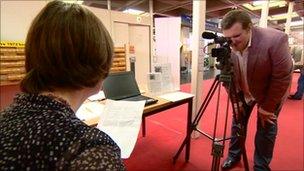Vernon Manuscript aims to unlock West Midlands accent origins
- Published
Experts at the University of Birmingham are using a 600-year-old medieval manuscript to try to unlock the origins of the West Midlands accent.
The Vernon Manuscript, which dates back to about 1400, was written in the region's dialect.
University researchers are asking local people to record parts of the text at a series of events.
They can then look at how the dialect has changed over time and what aspects are still used today.
'Incredibly important'
The Vernon Manuscript is said to be the largest surviving late-medieval manuscript.
It is made up of more than 350 texts spread over 700 pages and weighs 3st 6.5lb (22kg).
A collection of poetry and prose, experts said it was created by two regional scribes aiming to make religious texts accessible to people who did not speak Latin.
Research scholar Luke Darbyshire explains to BBC WM presenter Phil Upton what they have discovered so far
Research scholar Luke Darbyshire, from the University of Birmingham's English department, described the manuscript as an "incredibly important" part of local culture and history.
He said by asking local residents to read passages from the manuscript, they could look at the "relationship between the dialect of the Vernon Manuscript and the language of the modern West Midlands".
'Regional characteristics'
Mr Darbyshire added: "We are expecting to find that some common regional pronunciations and dialectical features present today stem from the medieval English used at the time of the manuscript.

Researchers are filming people reading parts of the Vernon Manuscript
"Eventually we are hoping to map where distinct regional characteristics have come from across the West Midlands, providing evidence that our regional dialect has been distinctive for more than 600 years."
Paul Woodward, from Birmingham, is rare book librarian at the city's Central Library and was one of those who had a go at reading the text.
"The medieval side was a little bit difficult but it is quite similar to how we speak today," he said.
As part of the project, the university is also working on producing a digital version of the manuscript, which is kept at the Bodleian Library in Oxford.
It was donated from a private collection in 1677.